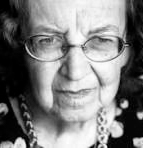

Maria Helena Monteiro da Rocha Pereira was born in Porto on 3 September 1925, into an upper-middle-class family. The daughter of Alfredo da Rocha Pereira, a Full Professor at the Faculty of Medicine of the University of Porto, Maria Helena da Rocha Pereira found in her father a guiding figure who greatly influenced her future as an expert in Classical Philology. This influence is apparent, for instance, in her admiration for figures linked to the history of medicine , such as Pedro Hispano, a 13th-century author who left an important legacy of medical works and who became the first and, to date, the only Portuguese Pope, namely John XXI. In Porto, M. H. da Rocha Pereira studied at the D. Carolina Michaëlis Secondary School, near her family’s home and not far from where she would pass away 91 years later, on 10 April 2017, after a lifetime dedicated to scholarship. Throughout her life, her affection for the city of Porto never waned, and she dedicated some of her studies to the city and notable figures associated with it, such as As imagens e os sons na lírica de Guerra Junqueiro [The Images and Sounds in the Poetry of Guerra Junqueiro] and O Porto na obra de Ramalho Ortigão [Porto in the Works of Ramalho Ortigão], both published in 1950 when the author was just 25 years of age .
In 1942, she enrolled in the Classical Philology course at the Faculty of Arts of the University of Coimbra, where she not only deepened her knowledge of Greek and Latin but also began studying Classical Hebrew. Her mastery of ancient languages was complemented by her exceptional command of several modern languages, including German, Spanish, French, English, and Italian. She graduated in Coimbra in 1947, studying under Professors such as Francisco Rebelo Gonçalves and Carlos Simões Ventura. After earning her degree, she returned to Porto and joined the Centre for Humanistic Studies associated with the University of the Invicta City. There, she delivered a series of lectures in 1948 on “Latin Literature,” which were later published. Until 1950, M. H. da Rocha Pereira engaged in teaching activities in Porto. That same year, she was awarded a scholarship by the Instituto de Alta Cultura [Institute of High Culture], enabling her to travel to the United Kingdom and enrol at the University of Oxford. Alongside the cities of Porto and Coimbra, Oxford would complete the trio of places that M. H. da Rocha Pereira would remain enchanted by throughout her life. Between 1950 and 1959, during three separate stays, Oxford offered the philologist and expert in Cultural History the opportunity to engage with and benefit from the mentorship of eminent classicists, such as E. R. Dodds, J. Beazley, E. Fraenkel, W. S. Barrett, and R. Pfeiffer, whom she always referred to as her mentors. With Dodds, in particular, she studied Greek Literature and Religion; with Beazley, she was introduced to the study of Greek vases, which allowed her to inaugurate a field of study that had been almost entirely unexplored in Portugal until then. To this day, in Portugal, M. H. da Rocha Pereira’s name remains synonymous with the highest authority not only in Greek ceramics but also in Greek art more broadly.
This work is financed by national funds through FCT - Foundation for Science and Technology, I.P, in the scope of the projects UIDB/04311/2020 and UIDP/04311/2020.
